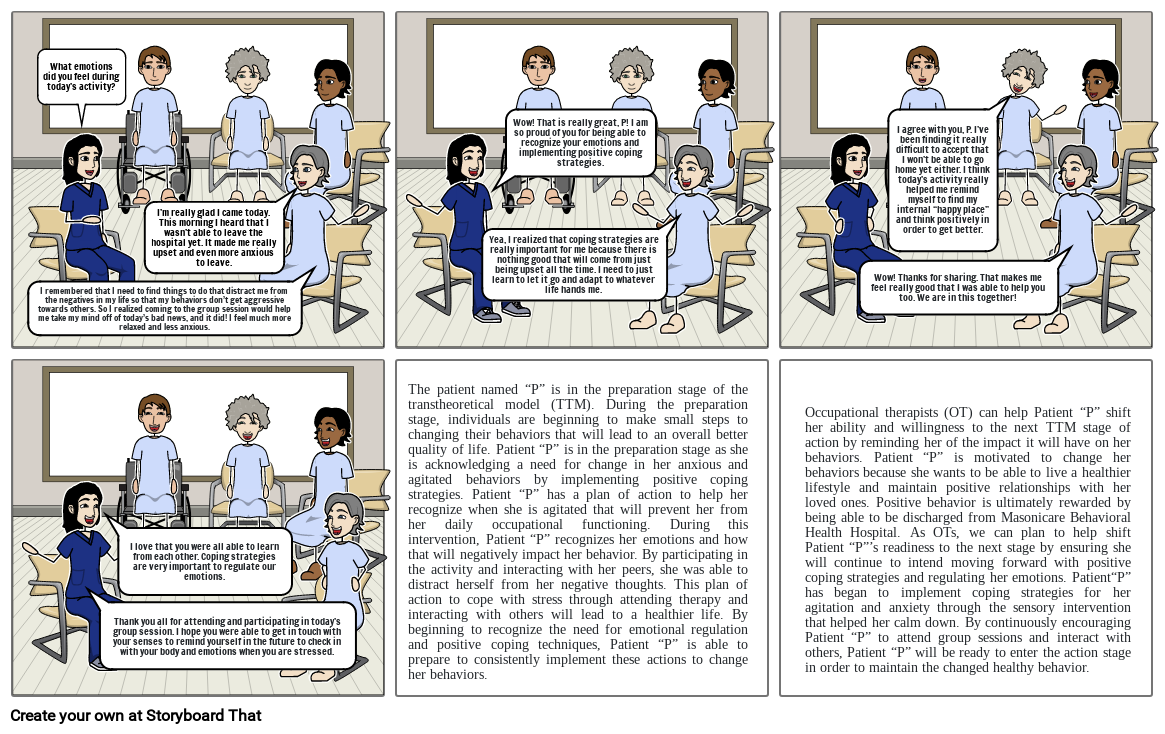Week 4 Comic Strip #2

Storyboard Tekst
- I remembered that I need to find things to do that distract me from the negatives in my life so that my behaviors don’t get aggressive towards others. So I realized coming to the group session would help me take my mind off of today’s bad news, and it did! I feel much more relaxed and less anxious.
- What emotions did you feel during today’s activity?
- I’m really glad I came today. This morning I heard that I wasn’t able to leave the hospital yet. It made me really upset and even more anxious to leave.
- Yea, I realized that coping strategies are really important for me because there is nothing good that will come from just being upset all the time. I need to just learn to let it go and adapt to whatever life hands me.
- Wow! That is really great, P! I am so proud of you for being able to recognize your emotions and implementing positive coping strategies.
- Wow! Thanks for sharing. That makes me feel really good that I was able to help you too. We are in this together!
- I agree with you, P. I’ve been finding it really difficult to accept that I won’t be able to go home yet either. I think today’s activity really helped me remind myself to find my internal “happy place” and think positively in order to get better.
- Thank you all for attending and participating in today’s group session. I hope you were able to get in touch with your senses to remind yourself in the future to check in with your body and emotions when you are stressed.
- I love that you were all able to learn from each other. Coping strategies are very important to regulate our emotions.
- The patient named “P” is in the preparation stage of the transtheoretical model (TTM). During the preparation stage, individuals are beginning to make small steps to changing their behaviors that will lead to an overall better quality of life. Patient “P” is in the preparation stage as she is acknowledging a need for change in her anxious and agitated behaviors by implementing positive coping strategies. Patient “P” has a plan of action to help her recognize when she is agitated that will prevent her from her daily occupational functioning. During this intervention, Patient “P” recognizes her emotions and how that will negatively impact her behavior. By participating in the activity and interacting with her peers, she was able to distract herself from her negative thoughts. This plan of action to cope with stress through attending therapy and interacting with others will lead to a healthier life. By beginning to recognize the need for emotional regulation and positive coping techniques, Patient “P” is able to prepare to consistently implement these actions to change her behaviors.
- Occupational therapists (OT) can help Patient “P” shift her ability and willingness to the next TTM stage of action by reminding her of the impact it will have on her behaviors. Patient “P” is motivated to change her behaviors because she wants to be able to live a healthier lifestyle and maintain positive relationships with her loved ones. Positive behavior is ultimately rewarded by being able to be discharged from Masonicare Behavioral Health Hospital. As OTs, we can plan to help shift Patient “P”’s readiness to the next stage by ensuring she will continue to intend moving forward with positive coping strategies and regulating her emotions. Patient“P” has began to implement coping strategies for her agitation and anxiety through the sensory intervention that helped her calm down. By continuously encouraging Patient “P” to attend group sessions and interact with others, Patient “P” will be ready to enter the action stage in order to maintain the changed healthy behavior.
Meer dan 30 miljoen storyboards gemaakt

